Siege of Ciudad Rodrigo
Part I
January 1812
The French and The Allies
Commentary by John Salmon, translations by Jane Hoyle
| |
Napoleon had risen through the turmoil of the French Revolution to command French armies and then the nation itself, first as Consul then as Emperor. Some say he was a scoundrel and a rogue who usurped the crowns of Europe and caused untold misery and death with his wars of conquest. Others see him as the deliverer of liberty and equality to downtrodden peoples. The truth is somewhere in between. Undeniably though, he was a superb commander of armies. Strategically, his concepts of warfare retain insights that are still valid today.
Like the Emperor, Marmont started his military career in the artillery. He came to Napoleon's attention at the siege of Toulon in 1793 and was appointed aide-de-camp to him in February 1796 for the Italian campaign. He returned to Paris in October 1796 with the captured Austrian standards, a duty which was regarded as an honour and a special mark of favour. He went to Egypt in 1798, more importantly as one of the select band who accompanied Napoleon on his escape across the Mediterranean back to France in August 1799 after the army had been cut off by Nelson's victory of the Nile on August 1st 1798. He was involved in the coup d'état de Brumaire (November 1799) which brought Napoleon to the Consulship. Marmont commanded the artillery at Marengo in 1800 which earned his promotion to Général de division, at the age of 26. He was not amongst the original list of Marshals in May 1804, an omission that rankled. In 1805, he commanded the II Corps and fought at Ulm. He missed Austerlitz later that year, fighting on the Italian front. In July 1806 he was appointed Governor of Dalmatia and pushed the Russian forces away from Ragusa which earned him his dukedom. He commanded the XI Corps in 1809 but was wounded while fighting in Italy and Croatia. He was at Wagram in July of that year, but as part of the reserve. He did fight at Znaim but over-extended his forces.
John L Pimlott in Chandler's Napoleon's Marshals comments that he was,
"lucky not to be defeated by the Austrian rearguard and, as Napoleon censured his actions, extremely fortunate not to jeopardise his promotion to Marshal, announced on July 12th. [7]
To bring him up to 1812: He stayed in the area known today as Yugoslavia until early 1811 when he was transferred to Portugal to take over the VI th Corps from Ney who was returning to France. Massena was in overall command but after his defeat by Wellington at Fuentes de Oñoro in May 1811 was recalled to Paris. Marmont was appointed commander of the Army of Portugal.
From this we can see that Marmont was close to Napoleon, possibly even a friend. He received honours and titles from the Emperor as well as promotions. Although the omission from the original ranking of the Marshals had hurt, he had eventually been included in that exclusive club. However, the manner of his promotion to Marshal had consequences that unfolded over the years. The censure that Napoleon delivered at the time is a classic, almost guaranteed to build up resentment against any future criticism of Marmont's actions.
"I am afraid that I have incurred the reproach of listening rather to my affection than to your right to this distinction. You have plenty of intelligence, but there are needed … war qualities which you are still lacking, and which you must work to acquire. Between ourselves, you have not done enough to justify entirely my choice." [8]
How Marmont felt about this can only be imagined. The promotion to Marshal, an event that should have been a crowning glory of his career and life would be for ever sullied by Napoleon's words. His reaction to criticism over the loss of Ciudad Rodrigo, as shown in Jane Hoyle's translations, should be viewed in the context of his bitterness about previous criticism from the Emperor.
Berthier was chief of staff, an intermediary between Napo-leon and commanders in the field. Napoleon's comments on Marmont's performance were channelled through Berthier, giving him on this, and many other occasions, the unenviable task of appearing to deliver bad news and criticism; a duty that led to much antagonism between him and many of the Marshals. How much he softened the Emperor's comments can only be imagined: that he acted as interpreter of his master's thoughts is certain. Marmont and other French commanders directed dispatches to Berthier in the certain knowledge that they would be passed on to the Emperor.
His areas of responsibility and those of Marmont had recently undergone a fundamental change in a reorganisation of commands in Spain undertaken by Napoleon. Ciudad Rodrigo was at a crucial time in a grey area between the commands. Although Dorsenne receives intelligence reports from General Thiébalt, Governor of Salamanca, warning of a threat to Ciudad Rodrigo he discounts them. A siege in mid-winter in the opinion of all the French commanders from Napoleon downwards, would be impossible to organise and supply.
Thanks to his local knowledge and his spy network Thiébalt kept him up to date Wellington's activities in the Ciudad Rodrigo area. His frequent messages of alarm over the fate of Ciudad Rodrigo were largely discounted, perhaps because there were so many of them.
General Barrié, governor of the French garrison of Ciudad Rodrigo [12]
To quote Oman he was -
"an officer who had been thrust into the post much contrary to his will, because he was the only general of brigade available at Salamanca when his predecessor Renaud was abducted by Julian Sanchez [the Spanish guerrilla leader]." [13]
His predecessor, General Renaud, was inspecting the garrison cattle, outside the fortress when he was captured by the guerrillas. The garrison consisted of 1818 men in two battalions, one of inexperienced recruits and the other an Italian Tucson battalion, supported by 163 engineers and 168 gunners. [14]
All of whom came from Thiébalt's division. There was an abundance of artillery stores in the fortress because it contained the siege train of the Army of Portugal and so there was no shortage of hardware or ammunition in the fortress. Food was scarce which was why despite it's strategic importance Dorsenne had garrisoned it with the minimum of troops.
His promotion to Field Marshal and Duke came in 1813 after the battle of Vitoria.
Wellington was by early 1812 a successful general in command of the only army in continental Europe that was actively fighting the French. Past successes against French forces had developed a healthy respect for his skills and the fighting abilities of his army. The defence of Portugal in 1810 and 1811 had been masterly, the French Army of Portugal had been repulsed with heavy losses and its commander, Massena, replaced by Marmont. The joint Anglo-Portuguese army included contingents from Great Britain, Portugal and Germany (the King's German Legion). Wellington worked closely with Spanish guerrilla leaders and those of the various provincial Juntas. His strategic objectives for 1812 included the capture of the frontier fortress of Ciudad Rodrigo in the north and Badajoz in the south. From these he would be able to advance into Spain and strike at one of the French armies occupying the country.
Sanchez was one of the most effective of the guerrilla leaders who commanded about 1200 lancers who were later incorporated into the regular Spanish army as the 1st and 2nd Lancers of Castille. [17] His depredations against French couriers were such that General Barrié, the Governor of Ciudad Rodrigo, was forced to use sympathetic Spaniards to pass on news of the siege to Marmont. It was also why additional supplies of food needed two or three battalions to get through. Sanchez's actions in virtually cutting off Ciudad Rodrigo from other French forces played a crucial part in this operation.
More Ciudad Rodrigo
|


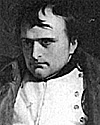 Napoleon Bonaparte, Emperor of the French, ruler of most of Europe or its occupier, depending on your point of view, and Commander in Chief of the French forces (1769-1821) [5]
Napoleon Bonaparte, Emperor of the French, ruler of most of Europe or its occupier, depending on your point of view, and Commander in Chief of the French forces (1769-1821) [5]
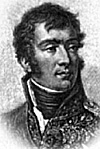 Marmont, Auguste Frédéric Louise Viesse de, (1774-1852) [6]
Marmont, Auguste Frédéric Louise Viesse de, (1774-1852) [6]
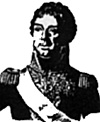 Berthier, Louis-Alexandre, prince de Neuchâtel et de Wagram (1753-1815) [9]
Berthier, Louis-Alexandre, prince de Neuchâtel et de Wagram (1753-1815) [9]
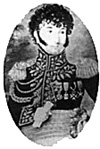 General Dorsenne, commander of the Army of the North [10]
General Dorsenne, commander of the Army of the North [10]
 General Thiébalt, governor of Salamanca [11]
General Thiébalt, governor of Salamanca [11]
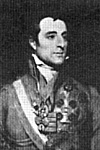 Wellington, General, Sir Arthur, Viscount of Wellington & Douro (1769-1852) [15]
Wellington, General, Sir Arthur, Viscount of Wellington & Douro (1769-1852) [15]
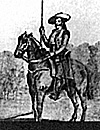 Julian Sanchez, Spanish guerrilla leader [16]
Julian Sanchez, Spanish guerrilla leader [16]